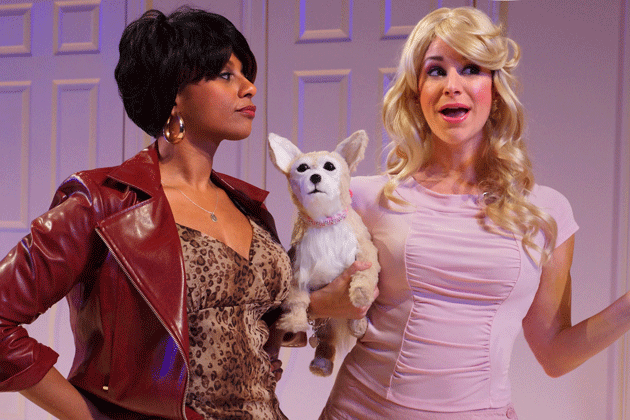
When online legal sites recently noted a Loyola Law School memo reminding female students of appropriate attire in the workplace, the image used in some reports is from the film “Legally Blonde,” a romantic comedy that addresses how women are judged by their appearance.
“How you look is still how you’re perceived. It’s an important message: Are you only taken seriously if you wear the black interview suit?” asks Lucy Gilson, associate professor of management in the School of Business and one of the panelists who will participate in a discussion, “From Power Suits to Pink Power: Professional Women in Pop Culture,” on April 2 at 4 p.m. in the UConn Women’s Center, located in the Student Union.
The panel is part of the “Uncommon Sense” series, a collection of free events developed by the Connecticut Repertory Theatre that investigates a variety of academic and aesthetic topics through performing art. CRT will present “Legally Blonde: The Musical” from April 24 to May 4 at the Jorgensen Center for the Performing Arts.
Other participants in the panel include Susan Schmeiser, professor of law at the School of Law; Nancy Bilmes, director of the UConn Center for Career Development; and Courtney Hammond, who stars as Elle Woods in the CRT production.
How you look is still how you’re perceived. It’s an important message: Are you only taken seriously if you wear the black interview suit? (Lucy Gilson)
“We felt it was very important to communicate to the University community the relevant themes and issues in the play, one especially relevant for young women before they go out into the workforce,” says Matthew J. Pugliese, interim managing director of CRT. “When producing a show like ‘Legally Blonde,’ so many people have been exposed to the popular film and its iconic character that they feel they already know what it is about.
“We felt this production offered a great opportunity to collaborate with the University’s professional students and reach a different audience,” Pugliese adds.
Gilson, who serves as academic director of the Geno Auriemma Leadership Conference, notes that managers can establish the proper climate and culture in an organization or corporation.
“Leadership plays a key role in this issue, setting standards and tone, and allowing employees to be themselves,” she says. “But there also are expectations and norms set by the industry. Leaders can say: it’s OK for us when we’re in the office to be casual every day. A lot of women struggle with when it’s casual, what are the norms? Spell it out. If you’re a leader and show up in jeans, after a while the employees will show up in jeans.”
Schmeiser says dress and appearance codes continue to be challenged legally, most often when they impose specific requirements by gender. One case involved a Reno, Nev. casino that adopted a strict grooming code requiring female employees to wear substantial amounts of makeup. A bartender, who had an otherwise long and exemplary record with the casino, was fired because she felt deeply uncomfortable in makeup and refused to wear it. Even though the courts hearing her case recognized that certain gender-differentiated requirements might amount to sex discrimination, she failed to persuade any of them that the makeup requirement imposed an unequal burden on women.
“These things do get litigated in these different contexts,” Schmeiser says. “It’s difficult to win unless the requirement clearly plays into certain kinds of sex stereotypes, such as airline rules that used to impose more stringent weight restrictions on female flight attendants than male attendants, because the airlines thought it would be better for business if the women serving beverages to passengers conformed to certain ideals of feminine beauty.”
Hammond says her character in the musical plays against a stereotype and ultimately prevails.
“Elle Woods is the opposite, a blonde not being taken seriously simply because of her hair color even though she is highly intelligent, very determined, very optimistic, and an idealist,” she says. “They just see her hair color. She talks about going brunette, thinking that’s going to change things, when really what the play is about is that your appearance shouldn’t matter. It should be about who you are.”
For regular updates on all “Uncommon Sense” series events and more information about “Legally Blonde: The Musical,” please visit www.crt.uconn.edu/uncommon-sense-series/.



